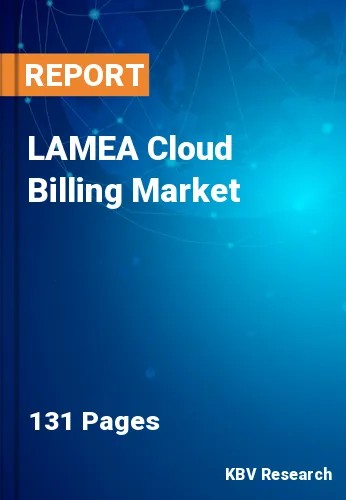The Latin America, Middle East and Africa Cloud Billing Market would witness market growth of 17.0% CAGR during the forecast period (2022-2028).
Cloud-based billing software expand over the customer-encountering feature of the company. It is instrumental in giving companies the intelligence required to improve internal procedures. Advanced billing solutions offer insights into the consumers’ experience by making reports and gathering usage data.
For example, this method could predict data usage to find out how the goods are being utilized. Then improve them to track revenue changes after product rollouts, provide statistical data on a new product’s success, better suit customer needs, and more. One of the most convincing reasons to switch to cloud billing is to decrease the effort and cost of on-site maintenance and installation.
Through cloud-based billing software, software upgrades, purchasing hardware to handle peak seasons, buying user licenses, etc., can be done with just some clicks. Another advantage of cloud billing is that businesses are no longer required to maintain hardware, staff technical experts, as well as risk of the system becoming obsolete. Mainly, cloud-based billing software allows businesses to eliminate high IT operating prices.
The government of Dubai is focusing on Emirate’s smart dynamic transformation in order to achieve its aim of Smart Dubai Plan. A high level of digitalization is being executed as a part of their scheme to protect the digital treasure of Dubai. Governments in nations like Israel and Brazil have raised their funding for advanced technologies such as cloud computing, 5G, big data, AI (artificial intelligence), ML (machine learning), and others, which is presumed to be the reason of the market growth. As one of the Middle East's most diverse and developed economies, the United Arab Emirates has a robust healthcare infrastructure. The UAE's government has prioritized developing the best healthcare infrastructure; consequently, the sector has grown and evolved remarkably throughout the last several years. This would result in regional market growth for the cloud billing market.
The Brazil market dominated the LAMEA Cloud Billing Market by Country in 2021, and would continue to be a dominant market till 2028; thereby, achieving a market value of $205.1 million by 2028.The Argentina market is experiencing a CAGR of 17.6% during (2022 - 2028). Additionally, The UAE market would display a CAGR of 16.7% during (2022 - 2028).
Based on Component, the market is segmented into Solution and Services. Based on Service Model, the market is segmented into SaaS, IaaS and PaaS. Based on Billing Type, the market is segmented into Usage Based, Subscription, One Time and Others. Based on Deployment Type, the market is segmented into Public, Private and Hybrid. Based on Enterprise Size, the market is segmented into Large Enterprises and Small & Medium Sized Enterprises. Based on Vertical, the market is segmented into Telecom & IT, BFSI, Media & Entertainment, Education, Construction, Healthcare, Consumer Goods & Retail and Others. Based on countries, the market is segmented into Brazil, Argentina, UAE, Saudi Arabia, South Africa, Nigeria, and Rest of LAMEA.
Free Valuable Insights: The Worldwide Cloud Billing Market is Projected to reach USD 10.1 Billion by 2028, at a CAGR of 15.2%
The market research report covers the analysis of key stake holders of the market. Key companies profiled in the report include Amazon Web Services, Inc. (Amazon.com, Inc.), Aria Systems, Inc., Recurly, Inc., Zuora Inc., SAP SE, Oracle Corporation, Cerillion PLC, Salesforce.com, Inc., Zoho Corporation Pvt. Ltd., and CGI, Inc.
By Component
By Service Model
By Billing Type
By Deployment Type
By Enterprise Size
By Vertical
By Country
Our team of dedicated experts can provide you with attractive expansion opportunities for your business.

